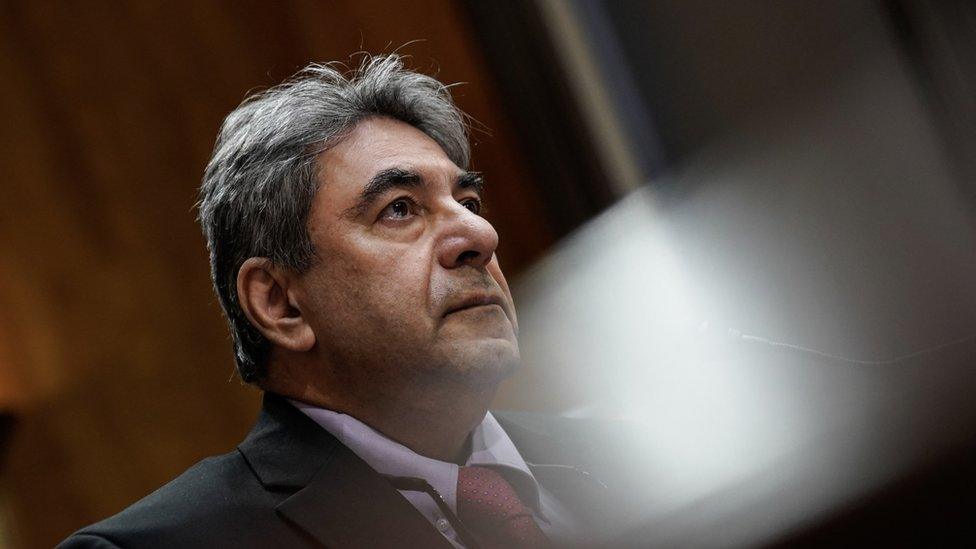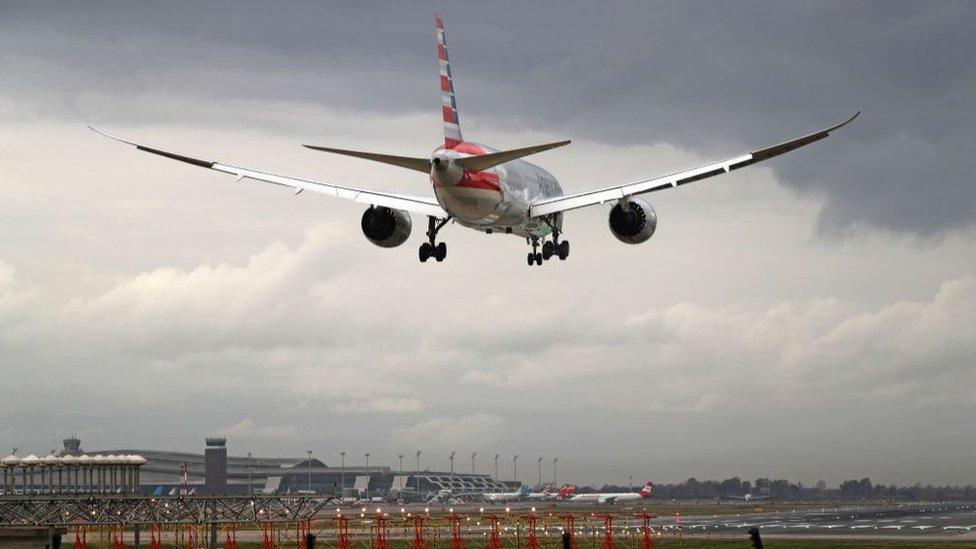Boeing whistleblower says he was put through 'hell'
- Published

A Boeing engineer told US lawmakers that he was harassed and threatened after he raised concerns about the safety of the company's planes.
Whistleblower Sam Salehpour said Wednesday that his boss berated him in a 40-minute call and his tyre was punctured by a nail.
He spoke at a hearing as part of a congressional investigation into safety at the manufacturing giant.
Boeing said it was trying to improve its safety culture.
"We know we have more work to do and we are taking action across our company," it said in a statement, after the hearing, one of two in Washington on Wednesday that focused on problems at the company.
The company has been in crisis since part of the body of a new Boeing 737 Max 9, flown by Alaska Airlines, broke off after take-off in January.
Passengers escaped serious injury, but the incident led to thousands of flight cancellations and renewed scrutiny of Boeing - which previously had to ground the 737 Max 8 after deadly crashes in 2018 and 2019 killed 346 people.
The hearing brought together three whistleblowers who have emerged as some of the company's most high-profile critics, including a former safety official at the Federal Aviation Administration (FAA).
Mr Salehpour, who has worked at Boeing for 17 years, said he had raised concerns about alleged manufacturing shortcuts repeatedly over three years starting in 2020, only to be told "to shut up".
"I was ignored, I was told not to create delays," he said, adding that he was later transferred to a different role. "This is not a safety culture, where you get threatened [for] bringing issues."
Senator Richard Blumenthal, who led the hearing, said his committee would investigate the issue. Just the announcement of the hearing had prompted other whistleblowers to step forward, he said.
"This story is serious, even shocking," he said. "There are mounting serious allegations that Boeing has a broken safety culture and set of practices that are unacceptable."
He said it was a "moment of reckoning" for Boeing and pledged further hearings that would involve officials from the company itself.
Boeing said retaliation was "strictly prohibited" and it had seen a "more than 500% increase" in reports from employees since January, "which signals progress toward a robust reporting culture that is not fearful of retaliation".
"We continue to put safety and quality above all else and share information transparently with our regulator, customers and other stakeholders," the company said.
A preliminary government investigation of what happened on the Alaska Airlines flight found that bolts were missing on the piece that blew off. The company now faces a criminal investigation and other lawsuits.
The head of the National Transportation Safety Board has criticised Boeing and accused it of failing to cooperate fully with the inquiry.
Another hearing witness, former Boeing manager Ed Pierson, who is now the executive director for the Foundation for Aviation Safety, accused the company of a "criminal cover-up", saying he had personally shared documents related to the missing bolts with the Federal Bureau of Investigation (FBI).
"There are some real problems at Boeing that have to get fixed," said Senator Ron Johnson, while noting the pressure from all corners to keep jets flying.
"We all want Boeing to succeed," he said. "People don't want to take the actions that might be required here. I think that's just an awful reality."
Mr Salehpour's concerns focused on the Boeing 787, a wider aircraft that was not the one involved in the Alaska Airlines flight or the earlier deadly crashes, but has been plagued by manufacturing issues.
He has said that the pieces making up the body of the plane were not being properly joined, which could raise the risk of failure over time.
He reported his concerns to the FAA in January and went public with them earlier this month.
The FAA has said it is investigating the claims, which Boeing has disputed.
On Wednesday, Mr Salehpour said he felt compelled to speak out, mindful of a carpool buddy who had worked on the Challenger shuttle and had his concerns ignored. The shuttle exploded in flight in 1986.
Boeing had responded to his concerns with pressure and retaliation, including making it more difficult for him to attend things like doctor appointments, he said.
Mr Salehpour, who teared up at one point during his testimony, said he had "no proof" that the nail in his tyre was related to Boeing but believed it happened while he was at work.
"This is hell that I was subjected to," he said.
Also on Wednesday, United Airlines, which is one of Boeing's biggest customers, said it will receive compensation from the plane maker for the financial impact it suffered due to the grounding of the 737 MAX 9.
The confidential agreement, external was filed a day after the carrier blamed Boeing for a $200m (£161m) hit to its earnings in the first three months of this year.
United was forced to ground its Boeing 737 MAX 9 fleet for three weeks after the Alaska Airlines incident in January.
Related topics
- Published9 April 2024

- Published17 April 2024